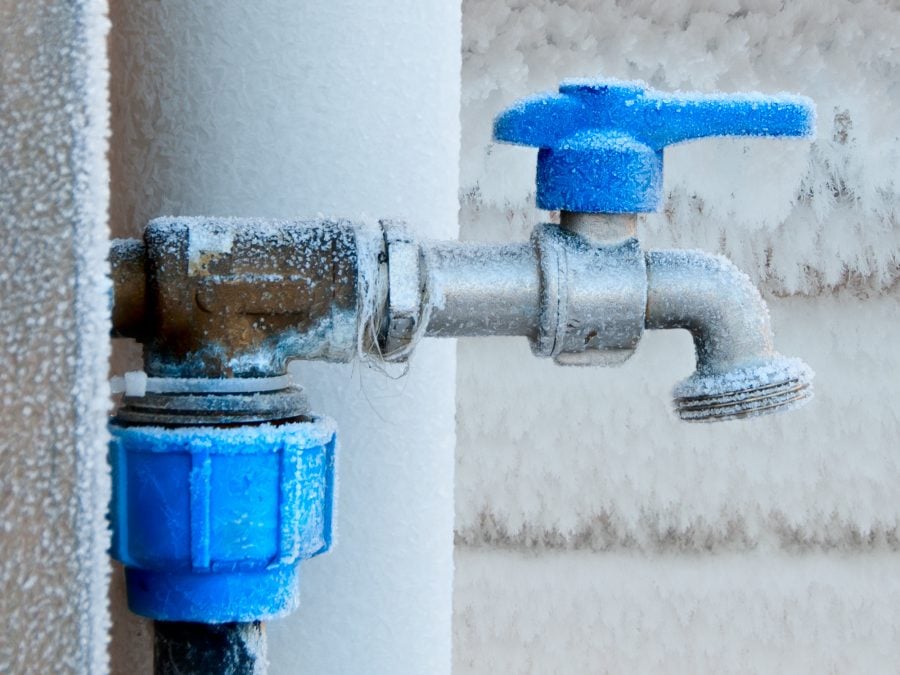Were you on the lookout for related information concerning How to prepare your home plumbing for winter weather?
:strip_icc()/snow-outdoor-faucet-pipes-4af65d1e5e904fb1aa7bf74071fe5d89.jpg)
Winter can ruin your pipes, specifically by freezing pipelines. Here's exactly how to stop it from happening and what to do if it does.
Introduction
As temperature levels decline, the threat of icy pipes increases, possibly bring about pricey fixings and water damages. Comprehending exactly how to prevent icy pipelines is vital for house owners in cold environments.
Avoidance Tips
Insulating at risk pipes
Cover pipelines in insulation sleeves or use warmth tape to safeguard them from freezing temperature levels. Focus on pipes in unheated or outside locations of the home.
Heating strategies
Keep indoor rooms effectively heated, particularly locations with pipes. Open cupboard doors to permit cozy air to circulate around pipes under sinks.
Exactly how to recognize icy pipes
Search for reduced water circulation from taps, unusual smells or sounds from pipes, and visible frost on exposed pipes.
Long-Term Solutions
Structural adjustments
Consider rerouting pipes away from exterior wall surfaces or unheated locations. Include additional insulation to attics, cellars, and crawl spaces.
Upgrading insulation
Invest in premium insulation for pipes, attics, and wall surfaces. Proper insulation aids maintain constant temperature levels and reduces the risk of icy pipelines.
Securing Outside Pipes
Yard tubes and outdoor faucets
Disconnect and drain garden hoses before wintertime. Mount frost-proof spigots or cover outdoor taps with shielded caps.
Comprehending Frozen Pipes
What creates pipes to freeze?
Pipelines freeze when revealed to temperature levels below 32 ° F (0 ° C) for expanded durations. As water inside the pipes freezes, it expands, taxing the pipe wall surfaces and possibly causing them to burst.
Dangers and damages
Frozen pipes can lead to water system disturbances, property damages, and costly fixings. Ruptured pipelines can flooding homes and cause comprehensive architectural damage.
Signs of Frozen Pipes
Identifying frozen pipelines early can avoid them from bursting.
What to Do If Your Pipes Freeze
Immediate activities to take
If you presume frozen pipes, keep taps open up to ease pressure as the ice melts. Use a hairdryer or towels taken in hot water to thaw pipelines slowly.
Verdict
Stopping icy pipelines needs proactive actions and fast responses. By comprehending the causes, indicators, and safety nets, property owners can shield their pipes during winter.
Helpful Tips to Prevent Frozen Pipes this Winter
UNDERSTANDING THE BASICS: WHY PIPES FREEZE AND WHY IT’S A PROBLEM
Water freezing inside pipes is common during the winter months, but understanding why pipes freeze, and the potential problems it can cause is crucial in preventing such incidents. This section will delve into the basics of why pipes freeze and the associated problems that may arise.
THE SCIENCE BEHIND FROZEN PIPES
When water reaches freezing temperatures, it undergoes a physical transformation and solidifies into ice. This expansion of water as it freezes is the primary reason pipes can burst. As the water inside the pipe freezes, it expands, creating immense pressure on the walls. If the pressure becomes too great, the pipe can crack or rupture, leading to leaks and water damage.
FACTORS THAT CONTRIBUTE TO PIPE FREEZING
Low Temperatures: Extremely cold weather, especially below freezing, increases the risk of pipes freezing. Uninsulated or Poorly Insulated Pipes: Pipes located in unheated areas, such as basements, crawl spaces, or attics, are more prone to freezing. Insufficient insulation or lack of insulation altogether exacerbates the problem. Exterior Wall Exposure: Pipes running along exterior walls are susceptible to freezing as they encounter colder temperatures outside. Lack of Heating or Temperature Regulation: Inadequate heating or inconsistent temperature control in your home can contribute to frozen pipes. PROBLEMS CAUSED BY FROZEN PIPES
- Pipe Bursting: As mentioned earlier, the expansion of water as it freezes can cause pipes to burst, resulting in significant water damage.
- Water Damage: When pipes burst, it can lead to flooding and water damage to your property, including walls, ceilings, flooring, and personal belongings.
- Structural Damage: Prolonged exposure to water from burst pipes can compromise the structural integrity of your home, leading to costly repairs.
- Mold and Mildew Growth: Excess moisture from water damage can create a favorable environment for mold and mildew growth, posing health risks to occupants.
- Disrupted Water Supply: Frozen pipes can also result in a complete or partial loss of water supply until the issue is resolved.
WHY CERTAIN PIPES ARE MORE PRONE TO FREEZING
- Location: Pipes located in unheated or poorly insulated areas, such as basements, crawl spaces, attics, or exterior walls, are at higher risk of freezing.
- Exterior Pipes: Outdoor pipes, such as those used for irrigation or exposed plumbing, are particularly vulnerable to freezing as they are directly exposed to the elements.
- Supply Lines: Pipes that carry water from the main water supply into your home, including the main water line, are critical to protect as freezing in these lines can affect your entire plumbing system.
- Underground Pipes: Pipes buried underground, such as those connected to sprinkler systems or outdoor faucets, can be susceptible to freezing if not properly insulated.
https://busybusy.com/blog/helpful-tips-to-prevent-frozen-pipes-this-winter/

Do you appreciate more info about Prevent Frozen Pipes ? Try to leave feedback below. We would be pleased to see your thinking about this write up. We are looking forward that you come back again soon. Those who enjoyed reading our post please make sure you remember to share it. I treasure reading our article about How to Prevent Your Pipes From Freezing.
Go Deal